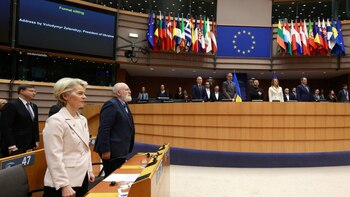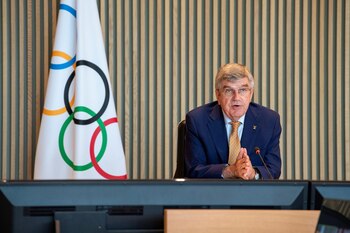
Pressure continues on the International Olympic Committee (IOC) not to allow athletes from Russia and Belarus to participate in the Paris 2024 Olympic Games: more than 30 countries made a joint statement expressing concern regarding the so-called neutrality under which athletes could be present in the French capital.
While the Olympic Committee spoke out against the boycott and in favor of not discriminating against athletes solely on the basis of passports, in the letter published by this group of countries, including the United States, Great Britain, France and Germany, they wonder how this neutrality will be possible when athletes are financed by their respective states.
In this sense, the text mentions the “great concerns about how feasible it is for Russian and Belarusian Olympic athletes to compete as ‘neutrals’, under the conditions of the IOC of non-identification with their country, when they are directly financed and supported by their states”.

The statement, which comes after the meeting that the sports ministers of these 35 countries had last February 10, at which the President of Ukraine, Volodymir Zelenski, was present, also refers to the fact that “the strong ties and affiliations between Russian athletes and the Russian army are also a source of clear concern... Our collective approach has always never been one of discrimination simply because of nationality, but these strong concerns must be addressed by the IOC. As long as these fundamental problems and the substantial lack of clarity and concrete details about a viable ‘neutrality’ model are not addressed, we do not agree that Russian and Belarusian athletes can compete again.”
Meanwhile, the message to the IOC ends by stating that “Russia and Belarus have it in their own hands to pave the way for the full return of their athletes to the international sports community, that is, putting an end to the war they began”.
The response of the International Olympic Committee was not long in coming and the organization ensures that it will “take into account” each of the concerns while noting that it “appreciates constructive questions”.

The IOC reported that “on February 1, 2023, two special rapporteurs of the United Nations Human Rights Council (the special rapporteur in the field of cultural rights and the special rapporteur on contemporary forms of racism, racial discrimination, xenophobia and related intolerance) issued a press release in which they said: ‘UN experts commended the International Olympic Committee for considering allowing individual athletes from Russia and Belarus to participate in international sports competitions such as neutral athletes. We urge the IOC to take a decision in that direction and go further, ensuring that no athlete is discriminated against based on their nationality’.”
The UN experts highlighted the support for Ukrainian athletes, although they stated that “the Olympic Committee and, more broadly, the Olympic community also have an imperative obligation to comply with the Olympic Charter and, more broadly, with international human rights standards that prohibit discrimination. When states so blatantly ignore human rights, we have a greater obligation to defend our common values.”

This joint statement by more than 30 countries comes to light after the European Parliament approves a resolution in which it demands that the IOC desist from the idea of allowing athletes from Russia and Belarus to participate in the Paris 2024 Olympic Games, at the same time it asked each member of the European Union to pressure the body to change its mind.
“It is extremely regrettable to intensify this discussion with a threat of boycott at this early stage. The participation of individual neutral athletes with Russian or Belarusian passports in the Paris 2024 Olympic Games has not yet been discussed,” said the IOC.
Últimas Noticias
Sinner-Alcaraz, the duel that came to succeed the three phenomenons
Beyond the final result, Roland Garros left the feeling that the Italian and the Spaniard will shape the great duel that came to help us through the duel for the end of the Federer-Nadal-Djokovic era.
Table tennis: Brazil’s Bruna Costa Alexandre will be Olympic and Paralympic in Paris 2024
She is the third in her sport and the seventh athlete to achieve it in the same edition; in Santiago 2023 she was the first athlete with disabilities to compete at the Pan American level and won a medal.

Rugby 7s: the best player of 2023 would only play the medal match in Paris
Argentinian Rodrigo Isgró received a five-game suspension for an indiscipline in the circuit’s decisive clash that would exclude him until the final or the bronze match; the Federation will seek to make the appeal successful.

Rhonex Kipruto, owner of the world record for the 10000 meters on the road, was suspended for six years
The Kenyan received the maximum sanction for irregularities in his biological passport and the Court considered that he was part of a system of “deliberate and sophisticated doping” to improve his performance. He will lose his record and the bronze medal at the Doha World Cup.

Katie Ledecky spoke about doping Chinese swimmers: “It’s difficult to go to Paris knowing that we’re going to compete with some of these athletes”
The American, a seven-time Olympic champion, referred to the case of the 23 positive controls before the Tokyo Games that were announced a few weeks ago and shook the swimming world. “I think our faith in some of the systems is at an all-time low,” he said.




